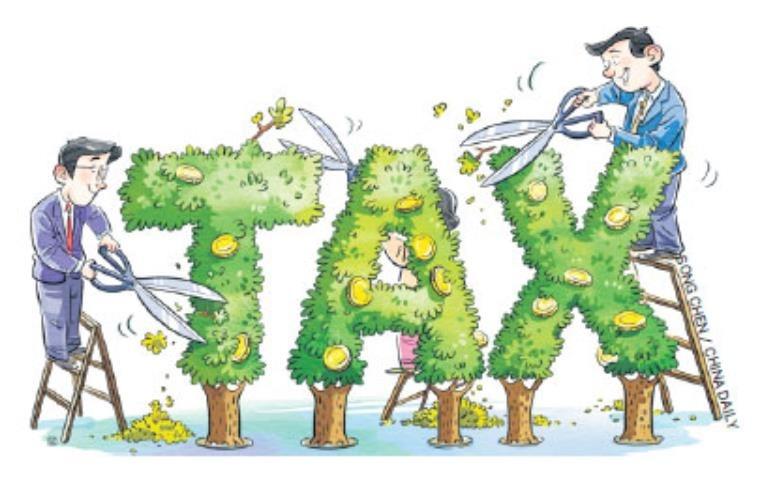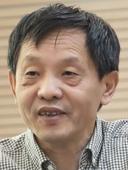 China is expected to continue its tax and fee cuts this year. (PHOTO / CHINA DAILY)
China is expected to continue its tax and fee cuts this year. (PHOTO / CHINA DAILY)
China is expected to continue its tax and fee cuts this year as part of the ongoing efforts to provide more support for small businesses, stabilize employment and spur innovation, a leading public finance expert said.
"It is certain that the country will continue the tax and fee cut policy this year," said Bai Jingming, former vice-president of the Chinese Academy of Fiscal Sciences, a think tank under the Ministry of Finance.
The nation is expected to maintain the stability and continuity of its tax and fee cut policy, Bai told China Daily earlier this week, adding that a final decision would be made based on the actual changes in the COVID-19 situation and economic conditions.
Compared with increasing government spending, tax cuts will be more effective in boosting high-quality economic development as they enable market entities to make spending decisions and thus leverage the advantage in achieving efficient resource allocation, said Bai Jingming, former vice-president of the Chinese Academy of Fiscal Sciences, a think tank under the Ministry of Finance
China is estimated to have cut more than 2.5 trillion yuan (US$387 billion) in taxes and fees last year, equivalent to about 2.5 percent of its annual GDP and up from 2.36 trillion yuan in 2019, officials said.
The Chinese economy still needs tax cuts to buffer downward pressure, given that the global recovery remains vulnerable to COVID-19 uncertainties, Bai said. Meanwhile, the reforms on value-added tax and personal income tax, initiated in recent years, will continue to cut tax burden this year.
His words came amid heated discussions over how the Chinese government will set its 2021 tax reduction target as it had to balance the need of normalizing its macro policy to prevent risks with the need to extend support to businesses still facing hardship.
"The tax and fee cut policy should keep its focus on vitalizing market entities, especially medium, small and micro-sized enterprises," Bai said, citing that smaller businesses benefit more from tax cuts and contribute more to stabilizing employment and spurring innovation.
Compared with increasing government spending, tax cuts will be more effective in boosting high-quality economic development as they enable market entities to make spending decisions and thus leverage the advantage in achieving efficient resource allocation, Bai said.
ALSO READ: China to support economic recovery, vows no 'policy cliff'
 Bai Jingming, former vice-president of the Chinese Academy of Fiscal Sciences. (PHOTO / CHINA DAILY)
Bai Jingming, former vice-president of the Chinese Academy of Fiscal Sciences. (PHOTO / CHINA DAILY)
The country's better-than-expected job creation last year was partly attributable to the large-scale tax and fee cuts, Bai said. Last year, 11.86 million new jobs were created in China's urban areas, notably exceeding the government's expected goal of more than 9 million, according to the National Bureau of Statistics.
Bai's words echoed Finance Minister Liu Kun's interview with the Xinhua News Agency published earlier this month, during which he said that China will maintain a proper strength of tax and fee cuts this year to help hard-hit businesses.
Bai said he expected stepped-up efforts this year to further elevate the efficiency of proactive fiscal policy, underlining the need to achieve effective macro adjustments while maintaining debt sustainability.
The country's fiscal income is expected to resume growth this year after a slide last year. Fiscal income may still feel some pressure amid continuous tax cuts and economic uncertainties, which will highlight the need to make fiscal spending more efficient, he said.
The Central Economic Work Conference held in December said that a proactive fiscal policy must be implemented in a manner that is of higher quality, more effective and more sustainable.
The government is expected to optimize the structure of spending to target expenditure more on addressing weak links and the areas with high positive spillovers, and to ensure the quality of government-funded projects via strengthened management, Bai said.
The use of the mechanism of directly channeling fiscal funds into the primary level of government is expected to be broadened this year, he added.
READ MORE: China to boost fiscal expenditure to ensure people's livelihood
China's proactive fiscal policy provided strong support in countering economic headwinds and addressing weak links in social development such as poverty alleviation last year, Bai said.


